Harsley Surname Ancestry ResultsOur indexes 1000-1999 include entries for the spelling 'harsley'. In the period you have requested, we have the following 19 records (displaying 1 to 10): Single Surname Subscription | | | Buying all 19 results of this search individually would cost £110.00. But you can have free access to all 19 records for a year, to view, to save and print, for £100. Save £10.00. More... |
These sample scans are from the original record. You will get scans of the full pages or articles where the surname you searched for has been found. Your web browser may prevent the sample windows from opening; in this case please change your browser settings to allow pop-up windows from this site. Boys at Eton
(1441-1698)
King Henry VI founded a college at Eton in Buckinghamshire in 1440, 'to the praise, glory and honour of the Crucified, the exaltation of the most glorious Virgin His mother, and the establishing of holy Church His bride'. From this foundation has evolved the modern public school. Sir Wasey Sterry compiled a register for the college from 1441 to 1698, from a variety of surviving records, and including groundwork from his 'A List of Eton Commensals' of 1904, and R. A. Austen-Leigh's 'A List of Eton Collegers' of 1905. This resulting 'Eton College Register' was published in 1943. Because of the variety of underlying materials, the entries vary greatly in depth: some names survive only as a surname of not too certain date. In the fullest entries, the surname (often with a variant spelling) is given first, in bold, followed by the years of entry and leaving. The christian name is given next; then birthplace, and name of father. The initials K. S. (King's Scholar) indicate a scholar on the foundation. There will then follow a summary of the man's career, death, burial and probate; and the sources for the information, in italics, at the end of the entry.HARSLEY. Cost: £4.00.  | Sample scan, click to enlarge

|  Masters of Apprentices
(1760) Masters of Apprentices
(1760)
Apprenticeship indentures and clerks' articles were subject to a 6d or 12d per pound stamp duty: the registers of the payments usually give the master's trade, address, and occupation, and the apprentice's name, as well as details of the date and length of the apprenticeship. 1 January to 31 December 1760.HARSLEY. Cost: £8.00.  | Sample scan, click to enlarge

| North Lincolnshire Non-Voters: Epworth Polling District
(1852)
The Poll Book for North Lincolnshire (Lindsey) in the General Election of 1852 was prepared from the poll clerks' lists, and so is arranged polling district by polling district, and within those by township or parish, but with non-voters listed separately at the end of each polling district. The 9,620 voters are listed not by residence, but by the parish or township in which lay the property that gave the right to vote: consequently 260 electors appear twice on the register. 1,797 did not vote. Many of the electors lived outside the area, or even outside the county. The names are listed roughly alphabetically by surname, with christian name, residence and occupation: with a key to the nature of their property (freehold fr, rented rt, or copyhold ch), and for whom the votes were cast (CR.: Rt. Hon. R. A. Christopher, who received 5,585 votes; CH.: Sir Montague J. Cholmeley, 4,777; S.: James Banks Stanhope, 5,575). Each elector had two votes. The franchise comprised all adult males in possession of 40s freehold, or £10 copyhold or leasehold, annual value. At the end of each polling district is a list of electors who did not vote, many living at a distance from the area.HARSLEY. Cost: £6.00.  | Sample scan, click to enlarge
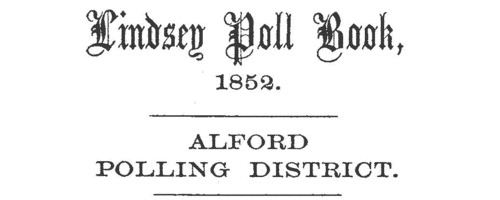
| North Lincolnshire Voters: Althorpe
(1852)
The Poll Book for North Lincolnshire (Lindsey) in the General Election of 1852 was prepared from the poll clerks' lists, and so is arranged polling district by polling district, and within those by township or parish, but with non-voters listed separately at the end of each polling district. The 9,620 voters are listed not by residence, but by the parish or township in which lay the property that gave the right to vote: consequently 260 electors appear twice on the register. 1,797 did not vote. Many of the electors lived outside the area, or even outside the county. The names are listed roughly alphabetically by surname, with christian name, residence and occupation: with a key to the nature of their property (freehold fr, rented rt, or copyhold ch), and for whom the votes were cast (CR.: Rt. Hon. R. A. Christopher, who received 5,585 votes; CH.: Sir Montague J. Cholmeley, 4,777; S.: James Banks Stanhope, 5,575). Each elector had two votes. The franchise comprised all adult males in possession of 40s freehold, or £10 copyhold or leasehold, annual value.HARSLEY. Cost: £6.00.  | Sample scan, click to enlarge
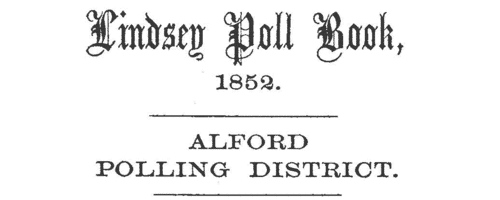
| North Lincolnshire Voters: Gainsborough
(1852)
The Poll Book for North Lincolnshire (Lindsey) in the General Election of 1852 was prepared from the poll clerks' lists, and so is arranged polling district by polling district, and within those by township or parish, but with non-voters listed separately at the end of each polling district. The 9,620 voters are listed not by residence, but by the parish or township in which lay the property that gave the right to vote: consequently 260 electors appear twice on the register. 1,797 did not vote. Many of the electors lived outside the area, or even outside the county. The names are listed roughly alphabetically by surname, with christian name, residence and occupation: with a key to the nature of their property (freehold fr, rented rt, or copyhold ch), and for whom the votes were cast (CR.: Rt. Hon. R. A. Christopher, who received 5,585 votes; CH.: Sir Montague J. Cholmeley, 4,777; S.: James Banks Stanhope, 5,575). Each elector had two votes. The franchise comprised all adult males in possession of 40s freehold, or £10 copyhold or leasehold, annual value.HARSLEY. Cost: £6.00.  | Sample scan, click to enlarge
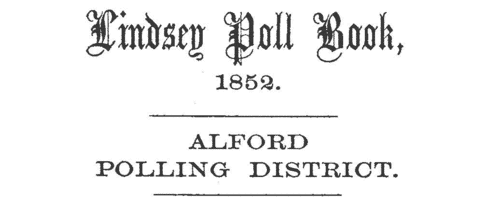
| North Lincolnshire Voters: Messingham
(1852)
The Poll Book for North Lincolnshire (Lindsey) in the General Election of 1852 was prepared from the poll clerks' lists, and so is arranged polling district by polling district, and within those by township or parish, but with non-voters listed separately at the end of each polling district. The 9,620 voters are listed not by residence, but by the parish or township in which lay the property that gave the right to vote: consequently 260 electors appear twice on the register. 1,797 did not vote. Many of the electors lived outside the area, or even outside the county. The names are listed roughly alphabetically by surname, with christian name, residence and occupation: with a key to the nature of their property (freehold fr, rented rt, or copyhold ch), and for whom the votes were cast (CR.: Rt. Hon. R. A. Christopher, who received 5,585 votes; CH.: Sir Montague J. Cholmeley, 4,777; S.: James Banks Stanhope, 5,575). Each elector had two votes. The franchise comprised all adult males in possession of 40s freehold, or £10 copyhold or leasehold, annual value.HARSLEY. Cost: £6.00.  | Sample scan, click to enlarge
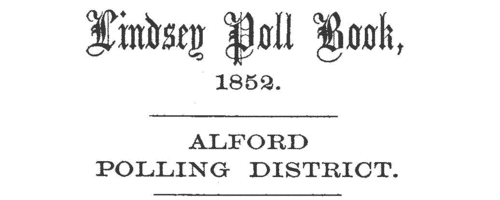
| North Lincolnshire Voters: Scotter
(1852)
The Poll Book for North Lincolnshire (Lindsey) in the General Election of 1852 was prepared from the poll clerks' lists, and so is arranged polling district by polling district, and within those by township or parish, but with non-voters listed separately at the end of each polling district. The 9,620 voters are listed not by residence, but by the parish or township in which lay the property that gave the right to vote: consequently 260 electors appear twice on the register. 1,797 did not vote. Many of the electors lived outside the area, or even outside the county. The names are listed roughly alphabetically by surname, with christian name, residence and occupation: with a key to the nature of their property (freehold fr, rented rt, or copyhold ch), and for whom the votes were cast (CR.: Rt. Hon. R. A. Christopher, who received 5,585 votes; CH.: Sir Montague J. Cholmeley, 4,777; S.: James Banks Stanhope, 5,575). Each elector had two votes. The franchise comprised all adult males in possession of 40s freehold, or £10 copyhold or leasehold, annual value. HARSLEY. Cost: £6.00.  | Sample scan, click to enlarge
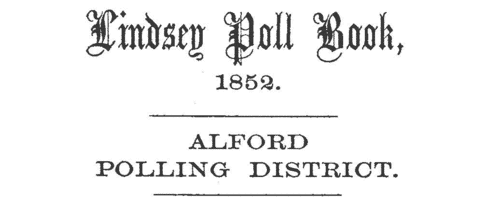
| Debtors, Insolvents and Bankrupts
(1880)
Bills of sale (binding assets to a creditor/lender), insolvencies and bankruptcies in England and Wales, January to March 1880HARSLEY. Cost: £6.00.  | Sample scan, click to enlarge

| Missing Next-of-Kin and Heirs-at-Law
(1880)
The Unclaimed Money Registry and Next-of-Kin Advertisement Office of F. H. Dougal & Co., on the Strand in London, published a comprehensive 'Index to Advertisements for Next of Kin, Heirs at Law, Legatees, &c., &c., who have been Advertised for to Claim Money and Property in Great Britain and all Parts of the World; also Annuitants, Shareholders, Intestates, Testators, Missing Friends, Creditors or their Representatives, Claimants, Unclaimed and Reclaimed Dividends and Stock, Citations, Administrations, Rewards for Certificates, Wills, Advertisements, &c., Claims, Unclaimed Balances, Packages, Addresses, Parish Clerks' Notices, Foreign Intestates, &c., &c.' The original list was compiled about 1860, but from materials dating back even into the 18th century: most of the references belong to 1850 to 1880. For each entry only a name is given, sometimes with a placename added in brackets: there may be a reference number, but there is no key by which the original advertisement may be traced. The enquirer of the time had to remit £1 for a 'Full and Authentic Copy of the Original Advertisement, together with name and date of newspaper in which the same appeared'. HARSLEY. Cost: £4.00.  | Sample scan, click to enlarge

| Money lenders and other creditors
(1880)
Bills of sale transferred title in all property of a debtor to a specified creditor. Possession of a bill of sale thus protected a money lender or other creditor from losing a debtor's property to other creditors (except landlords) in case of insolvency or bankruptcy; and in many cases signing a bill of sale was a required step for a borrower securing a loan. The bill of sale specified the amount thereby secured, but could be open, i. e., allow for further drawings on the same account. Entries from the official register of bills of sales in England and Wales were published in Flint & Co.'s London Manchester and Dublin Mercantile Gazette, a weekly publication available only by subscription, issued under the motto "Security in Crediting". The entries are listed by county, then alphabetically by debtor, surname first, with address, trade, the name of the creditor ('in whose favour'), dates of issue and filing, and amount. An &c. after the amount indicates an open bill. The creditors that appear in the 'in whose favour' column are mainly, but not exclusively, loan companies and individual money lenders, and Jewish names figure prominently among the latter. When a loan was paid off, satisfaction of the bill of sale was entered on the register, and these satisfactions are also recorded in these pages. 1 January to 31 March 1880.HARSLEY. Cost: £6.00.  | Sample scan, click to enlarge

|
| 1 | 2 |  |
Research your ancestry, family history, genealogy and one-name study by direct access to original records and archives indexed by surname.
|













